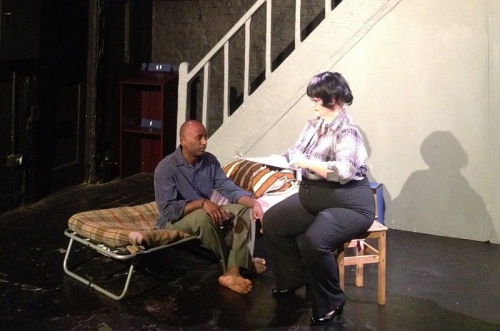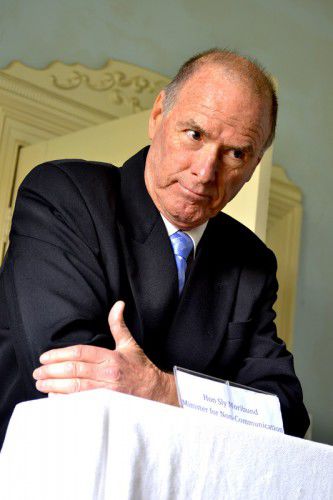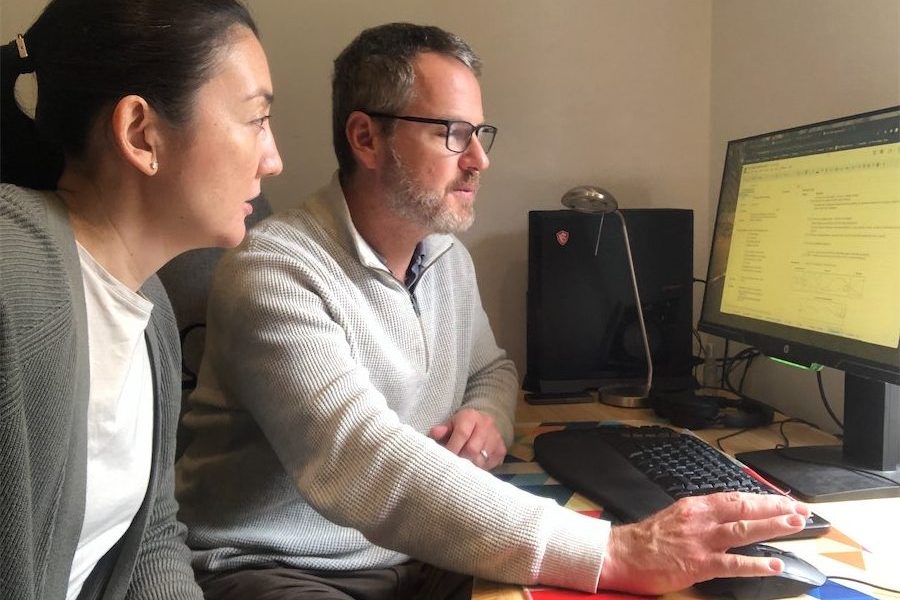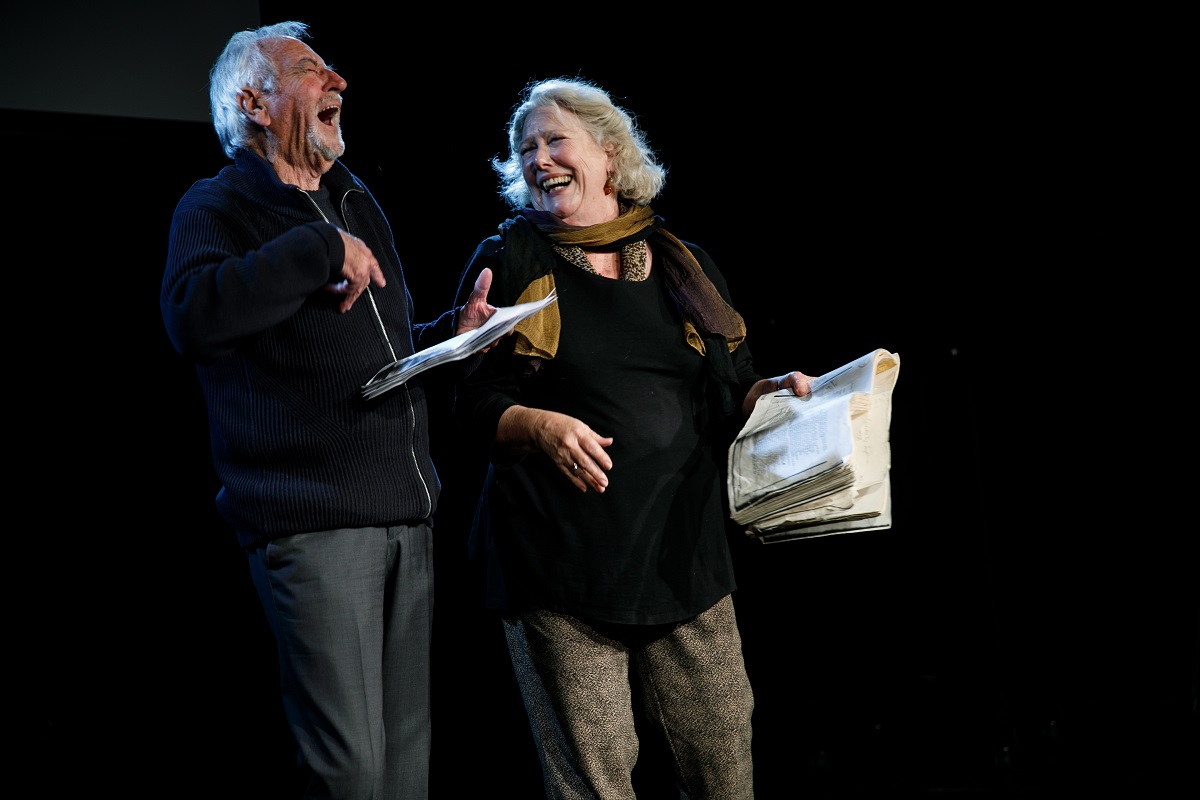AS “CityNews” predicted a couple of weeks ago, The Street Theatre has popped a rare play into its season this week, with “The Process,” a timely work about asylum seekers that has recently had people raving enthusiastically at Melbourne’s La Mama Theatre.

It coincides nicely with Belconnen Arts Centre’s current exhibition “Seeking Humanity,” Wendy Sharpe’s drawings of individual refugees.
Written by Ian Robinson and directed by Ian Robinson and his wife Maggie Millar, “The Process” features long-unseen Australian theatre legend Sean Scully as well as TV star Jessica Muschamp and Tamil-Australian actor Ezekiel Day.
I caught up with Millar recently by phone to Melbourne, where she’d just been bitten by a European wasp.
But what we’re talking about is much more important than wasps, so she masters her pain to discuss a subject far too infrequently tackled on our stage.

Millar and Robinson are betting that Canberrans will especially relate to scenes of Immigration Ministers of both political colours negotiating through a press conference – a masterly moment for Scully, who plays both.
Millar, herself an acting graduate of the Royal Academy of dramatic art, RADA, modestly tells me that “Robbo is the head honcho”, that her role is to sort out any “issues with actors” and that “if you cast well it’s half your problem solved.” It’s obviously been a fascinating experience getting “The Process” together and it raises all sorts of questions about how to approach a difficult subject with such immediate impact.
The process of creating “The Process” began when ‘Robbo’ was approached by the advocacy group, Liberty Victoria, formally the Victorian Council for Civil Liberties, who wanted him to do something about refugees and suggested that he might like to adapt Kafka’s novel “The Trial” for the stage.
“No, I’d rather write a play about what’s happening in Australia, here and now,” Robinson responded. Although he was prepared to draw some of the inspiration from Kafka, Millar had already been involved with the organisation Actors for Refugees even before the advent of the Rudd and Gillard governments and had, with the help of former parliamentarian Carmen Lawrence, got inside Parliament house to do a performance some years ago. “I was delighted to be part of it,” Millar says.
“Now, Robbo’s written this wonderful, quite wonderful play,” she enthuses. Yes, it’s in five acts, but it is only 80 minutes long, it’s not ‘King Lear’…It’s bald satire and quite funny in spots but it’s also very tragic as it focuses on a particular refugee… If you can get to the particular, you can universalise subject.” That’s the Kafkaesque bit, and they’ve been told by Tamil refugees who know nothing of Kafka that it works.
Luck was on their side when Tamil-Australian actor Ezekiel Day turned up. “We wanted to have a genuine Tamil or an actor who could make the audience believe he was a Tamil,” but in fact Day proved to be both a seasoned NIDA graduate and a “riveting” performer.
As well, with Muschamp trained at Lamda in London and Scully “one of the best actors this country has ever seen,” the heartstrings are well and truly tugged.
But it’s not all doom and gloom. In the theatrical style chosen by Robinson, the politicians are funny and there are many very realistic scenes too. He wrote the play in different styles and the actors have picked up on that Millar tells me.
The multi-genre outline is as follows:
In ACT 1 it’s comedy, where the asylum seeker is welcomed to Australia by an immigration Department officer who begins, “the process.” That’s where the Kafka parallels come in – wherever he turns, there’s a closed door. The refugee is in limbo. But Millar thinks the immigration officer who lacks any interpersonal skills may command some sympathy too, as played by Scully.
In Act 2 we’re into farce when two Federal ministers explain the “no advantage” policy. The play was written with one minister only when Labor was in power, so had to be reshaped. Scully plays both.
Act 3 turns to tragicomedy when the asylum seeker discovers he has no place to go. Here Muschamp plays an idealistic young lawyer, a top Melbourne University graduate who is empathetic but can do nothing – it’s the policy, there is no way out.
Act 4 descends to burlesque when a Coalition minister stops nearly everything. Millar knows that a local Labor member came to see this and was “blown away,” but as far she knows no Coalition members have seen the play so far. She noted that when Actors for Refugees played in Canberra, only Liberal MP Petro Georgiou came.
Act 5 is pure tragedy when the asylum seeker makes “the only possible response.” No, Millar will not tell us what happens, except to say that members of the audience gasped at the end, a “profoundly moving experience.”
“The Process”, she says, is done very simply and staged in such a way that they can take it anywhere and simply suggest the atmosphere with lighting.
Robinson might as well have the last word before the shows comes to Canberra: “I challenge any parliamentarian from the two major parties to attend this production and not come away demanding changes to the system”.
“The Process,” at Street 2, March 25-28, bookings to thestreet.org.au or 6247 1223.
Who can be trusted?
In a world of spin and confusion, there’s never been a more important time to support independent journalism in Canberra.
If you trust our work online and want to enforce the power of independent voices, I invite you to make a small contribution.
Every dollar of support is invested back into our journalism to help keep citynews.com.au strong and free.
Thank you,
Ian Meikle, editor




Leave a Reply